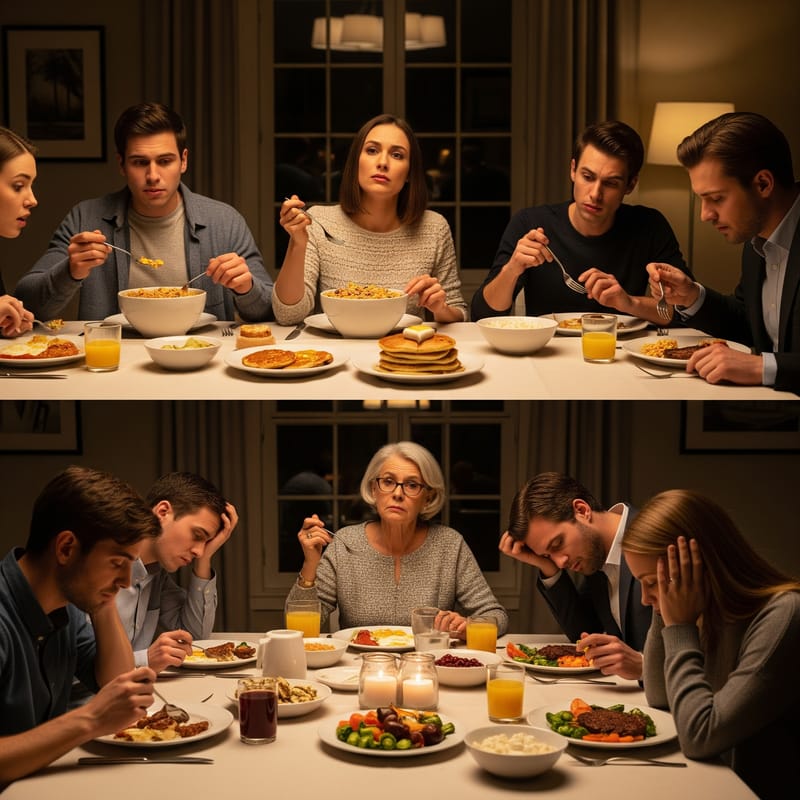The Great Reversal of Breakfast: When Cereal Becomes Dinner
Why: This plays on disrupting established norms for no practical reason. While less severe in "consequences" than, say, crashing drones, the sheer irrationality and inconvenience of it would likely elicit an amused but definitive "eye roll" from Breyer, who would ponder the "purpose" of meal times and find this trend utterly lacking.
In a bold, if utterly perplexing, move aimed at "reimagining culinary efficiency" and "disrupting traditional food paradigms," the city of Gastronomica enacted Ordinance 867, affectionately (or perhaps, sarcastically) known as "The Chrono-Nutrition Act." This ordinance, championed by a vocal group of "food futurists," declared that all meals typically consumed at breakfast (cereals, pancakes, eggs, bacon, etc.) must now be consumed between 6 PM and 9 PM, while meals traditionally eaten for dinner must be consumed between 6 AM and 9 AM. Lunch remained untouched, perhaps as a concession to common sense. The city's stated purpose was to "unlock hidden metabolic efficiencies" and "challenge ingrained dietary habits." The immediate result was widespread culinary confusion, social disruption, and a lawsuit, Gastronomica Citizens for Sensible Suppers v. City of Gastronomica, now headed to the Supreme Court.
Justice Stephen Breyer, known for his pragmatic approach that often boils down to asking "Does this actually work? What are the consequences?", would likely approach "The Great Reversal of Breakfast" with a mixture of bemusement and a deep-seated frustration at the sheer irrationality of it all. While not a matter of life and death, or fundamental rights in the gravest sense, this case perfectly highlights his focus on purpose and practicality in governance. He would certainly deliver an "eye roll" with a side of rigorous legal analysis.
A Pragmatic Query into Culinary Chaos
Breyer's Eye Scream!
Breyer would, with a slight shake of his head, first address the stated purpose of the ordinance: "unlocking hidden metabolic efficiencies" and "challenging ingrained dietary habits." He would then immediately dissect these claims against any discernible, practical benefit. Is there any scientifically robust evidence that eating cereal at night and steak in the morning genuinely improves health or efficiency for the general populace? Almost certainly not in any significant, universally applicable way. The "purpose" would appear flimsy, based more on faddish theoretical musings than on sound public health or logistical planning.
Then would come the examination of the actual, observable consequences – the real-world impact on the citizens of Gastronomica:
- Social Disruption and Inconvenience: Meal times are not just about nutrition; they are deeply ingrained social rituals. Family dinners, business lunches, breakfast meetings – these are cornerstones of social and professional life. Forcing a city-wide reversal would create immense social friction and inconvenience. Imagine trying to schedule a "breakfast" meeting at 7 PM with a client accustomed to coffee and pastries, now confronted with pot roast. Or attempting a "dinner" with friends at 7 AM, while half the city is still groggy. The ordinance undermines established social conventions for no clear benefit, making daily life unnecessarily complicated and awkward.
- Economic Dislocation: The food service industry relies heavily on established meal patterns. Restaurants, grocery stores, and food suppliers are optimized for morning breakfast rushes and evening dinner crowds. Suddenly, requiring restaurants to serve full dinner menus at 6 AM and breakfast at 6 PM would necessitate a massive, costly overhaul of supply chains, staffing, and menu planning. Many smaller businesses might not survive the transition. For Breyer, a law that creates such widespread economic dislocation without a compelling public interest is profoundly impractical.
- Dietary Practicalities and Health Concerns: While one can eat cereal for dinner, it's often a less balanced meal compared to a typical dinner. Conversely, heavy dinner foods in the morning might not sit well with many people, potentially leading to discomfort or reduced productivity. The ordinance ignores the practicalities of digestion and individual dietary needs. While not dictating what to eat, it dictates when in a way that is profoundly unhelpful and potentially counterproductive to general well-being.
- Enforcement Absurdity: How would such a law even be enforced? Would "Chrono-Nutrition Cops" monitor plates? Would restaurants face fines for serving eggs Benedict at 8 AM? The very notion of enforcing mealtime decrees highlights the absurdity and impracticality of the ordinance. Laws that are unenforceable or require ridiculous measures for enforcement often fail Breyer's pragmatic test.
- Violation of Personal Autonomy (Subtly): While not as direct as forcing mime participation, a law dictating when one must eat certain types of food subtly infringes on personal autonomy and the freedom to make basic choices about one's daily life. For Breyer, the government's role is not to micromanage such mundane aspects of private existence unless there is an overwhelming public health or safety justification—which is clearly absent here.
In court, Breyer would likely probe the city's attorneys with questions designed to expose the policy's lack of a rational basis and its adverse consequences. He might ask: "Where is the scientific evidence supporting these 'metabolic efficiencies'? How does this ordinance improve public health in a way that justifies upending an entire city's culinary habits? What are the actual benefits versus the costs to businesses and families?" He would likely challenge them to articulate a concrete, practical problem this ordinance solves, beyond simply "challenging norms."
Ultimately, "The Great Reversal of Breakfast" would epitomize a law that, while perhaps born of a quirky idea, utterly fails Breyer's pragmatic scrutiny. It lacks a legitimate and demonstrable public purpose, creates widespread inconvenience and economic disruption, and unnecessarily interferes with personal choices for no discernible benefit. For Breyer, the "consequences" of forcing people to eat steak for breakfast and cereal for dinner would be so obviously irrational and burdensome that the ordinance would undoubtedly receive his judicial "eye roll" followed by a decisive ruling that underscores the need for laws to actually make sense and work in the real world.
Video created with Gemini Pro for the Eye Scream series, a tribute to Justice Stephen Breyer.






